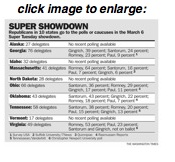All of the Republican primaries and caucuses so far amount to mere appetizers ahead of next week’s main course, when GOP faithful go to the polls for Super Tuesday — the 10-state showdown that will signal how much longer long the nomination battle goes on.
Mitt Romney, running a national campaign, hopes to go a long way toward sewing things up next week with a strong showing — but his three major rivals each want to win in different parts of the country, scenarios that could further damage the air of inevitability Mr. Romney has tried to cultivate.
Former House Speaker Newt Gingrich didn’t bother to compete in Tuesday’s Arizona and Michigan contests, instead spending the past week battling in Washington, which holds caucuses on Saturday, and then Idaho and Georgia, before turning to Tennessee.
All three of those states are part of Super Tuesday, as are North Dakota, Virginia, Vermont, Massachusetts, Ohio and Oklahoma. Alaska’s conventions also begin on March 6.
“Winning next Tuesday moves us toward Tampa in a big way,” Mr. Gingrich said while campaigning on Tuesday, referring to the Florida site of the Republican National Convention in late August. “Georgia is the biggest group of delegates out there on Super Tuesday, so this is a big deal and it really, really matters.”
 He is leading in polling in Georgia, while former Sen. Rick Santorum of Pennsylvania holds a lead in Ohio, Oklahoma and Tennessee.
He is leading in polling in Georgia, while former Sen. Rick Santorum of Pennsylvania holds a lead in Ohio, Oklahoma and Tennessee.
Mr. Santorum even took time out of campaigning in Michigan on Tuesday to drop into Perrysburg, Ohio, for a quick rally before shooting back north for a post-primary party in Grand Rapids, Mich.
For his part, Mr. Romney heads to Ohio early Wednesday morning, where he once again will have to play catchup.
He does hold a commanding lead in polls in Massachusetts, where he served a term as governor, and also leads polling in Virginia, where the contest is a two-man race between him and Rep. Ron Paul of Texas.
Neither Mr. Gingrich nor Mr. Santorum secured enough signatures to get on Virginia’s ballot, and the rules don’t allow a write-in candidate.
Mr. Paul is the only candidate still in the race who has not won a single state. He, like Mr. Gingrich, did not put much effort into Michigan or Arizona, and on Tuesday he was already in Virginia holding a rally.
His campaign also launched another “money bomb” fundraiser, challenging the congressman’s dedicated supporters to flood his campaign with money to help them with get-out-the-vote-efforts headed into next week.
“Time is running out,” campaign manager John Tate said in an email to supporters. “Without an immediate influx of funds, I’ll have to cut out crucial parts of this plan or just ignore some states altogether.”
The field has been remarkably stable, with just four candidates competing since South Carolina, more than a month ago. And each of them vows to compete deep into the race.
Nationally, all eyes will still be on Mr. Romney, who is the only candidate to make a play for every state that has voted so far.
Before Arizona and Michigan, he had won New Hampshire, Florida, Nevada and Maine, and came in second in Iowa, South Carolina and Colorado, and in Missouri’s nonbinding primary. He came in third in Minnesota.
The national presence has paid off, as he’s easily outdistanced his rivals for the most delegates won so far.
His test now will be to see if he can pick up support in the Midwest, where he has struggled to connect.
• This article is based in part on wire service reports.
• Stephen Dinan can be reached at sdinan@washingtontimes.com.



Please read our comment policy before commenting.